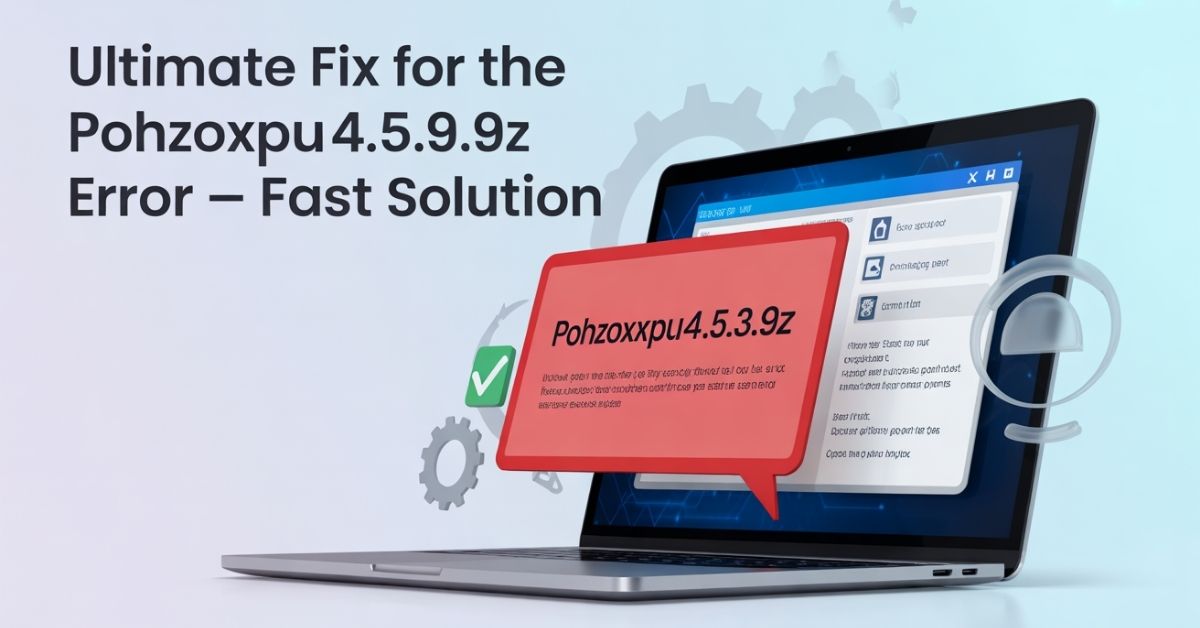That dreaded pohzoxpu4.5.3.9z error can bring your development workflow to a screeching halt, leaving you searching through cryptic logs. This frustrating cache corruption or version mismatch issue doesn’t have to waste your afternoon. By the end of this guide, you’ll have executed a clear, step-by-step troubleshooting process to resolve the error and implemented a strategy to prevent it for good.
What Causes the pohzoxpu4.5.3.9z Error?
Understanding the root cause is the first step to a permanent fix. The pohzoxpu4.5.3.9z identifier typically points to a specific failure in a dependency management or build process. It’s often not a single bug, but a symptom of a deeper environmental issue.
Common Triggers and Scenarios
- Corrupted Local Cache: The most common cause is a poisoned local dependency cache that serves broken artifacts to your build tool.
- Version Conflict: A dependency hell scenario where two libraries require incompatible versions of a shared package, triggering a failure.
- Network Timeout During Download: A partial or corrupted package download caused by an unstable internet connection during the initial install or update command.
- Incompatible Plugin: A third-party plugin or extension that hasn’t been updated for the current version of your core framework, leading to a runtime conflict.
How to Read the Accompanying Log Files
Don’t just look for the error code. The true clues are in the surrounding log entries.
- Look for WARN or ERROR messages immediately before the pohzoxpu4.5.3.9z line.
- Identify the file path or module name mentioned. This often points to the offending library.
- Note any checksum validation failures (e.g., SHA256 mismatch), which confirm a corrupted download.
Troubleshoot the pohzoxpu4.5.3.9z Error in 5 Minutes
Follow these steps in order. Most users resolve their issue by Step 2.
Step 1: Verify Your Environment Configuration
First, rule out a simple path or version mismatch.
# Check your core tool version (e.g., Node, Maven, Python)
node –version
mvn –version
# Verify environment variables
echo $PATH
echo $YOUR_TOOL_HOME
Ensure everything matches your project’s required versions as stated in the package.json, pom.xml, or requirements.txt file.
Step 2: Clear the Corrupted Cache Files
This is the most effective quick fix. Locate and purge the cache directory for your tool.
# Example for a Node.js/npm project
npm cache clean –force
rm -rf node_modules
rm package-lock.json
# Example for a Java/Maven project
mvn dependency:purge-local-repository
After clearing, perform a fresh install: npm install or mvn clean install.
Step 3: Run the Dependency Integrity Check
Use your package manager’s built-in tool to verify the integrity of your dependencies.
# npm
npm audit
# Maven
mvn dependency:analyze
# Python/Pip
pip check
This will identify any broken or vulnerable dependencies that need manual intervention.
Apply the Permanent pohzoxpu4.5.3.9z Fix
Quick fixes are great, but let’s ensure this doesn’t happen again.
Updating to the Latest Stable Version
The pohzoxpu4.5.3.9z error may be a known bug patched in a later release.
- Check your project’s official documentation or GitHub repository issues for the error code.
- Update your core tool and dependencies to the latest stable versions.
- For Java projects, consider using a dependency management bill of materials (BOM) to enforce consistent versions.
Modifying Your Configuration for Stability
Pin your versions to prevent unexpected breaks.
- In package.json, use exact versions (“1.2.3”) instead of carets (“^1.2.3”).
- In Maven, use the <dependencyManagement> section to control transitive dependencies.
- In Dockerfiles, use specific base image tags, not latest.
Prevent This Error From Happening Again
Proactive measures save future headaches.
Automate Your Dependency Checks
Integrate tools like Dependabot or Renovate into your GitHub repository. They automatically create pull requests to update vulnerable or outdated dependencies, keeping your project healthy.
Best Practices for Stable Deployments
- Use a Lock File: Always commit package-lock.json, yarn.lock, or Pipfile.lock to ensure all developers and deployment servers use identical dependency trees.
- Implement a CI/CD Pipeline: A robust pipeline that runs clean install -> build -> test on every commit can catch dependency issues before they reach production.
FAQ’s About pohzoxpu4.5.3.9z
Q1: Is the pohzoxpu4.5.3.9z error a security risk?
Typically, no. It’s primarily a build system failure related to caching or versioning, not a security vulnerability. However, always run npm audit or equivalent to rule out related security issues.
Q2: I’ve tried all steps, but the error persists. What now?
The nuclear option is often effective: Clone a fresh copy of your repository into a new directory, ensure you have the correct runtime versions, and run a fresh install. This guarantees a clean environment.
Q3: Does this error only occur in JavaScript projects?
No. While our examples use Node/npm, the pohzoxpu4.5.3.9z error pattern is universal. The same principles of cache management and dependency resolution apply to Java/Maven, Python/pip, and .NET/NuGet ecosystems.
Conclusion
The pohzoxpu4.5.3.9z error, while intimidating, is almost always solvable by methodically clearing corrupted state and enforcing version consistency. You now have a battle-tested playbook: from a 5-minute quick fix to long-term prevention strategies. Start by clearing your cache, and solidify your workflow with automation and best practices.
Continue your learning journey. Explore more helpful tech guides and productivity tips on my site Techynators.com.

Hi, I’m James Anderson, a tech writer with 5 years of experience in technology content. I’m passionate about sharing insightful stories about groundbreaking innovations, tech trends, and remarkable advancements. Through Techynators.com, I bring you in-depth, well-researched, and engaging articles that keep you both informed and excited about the evolving world of technology. Let’s explore the future of tech together!








